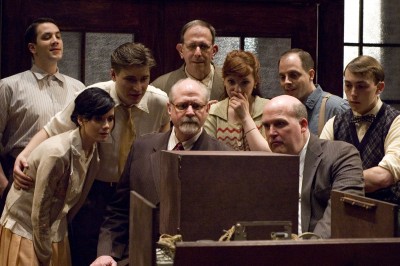Right here:

Archives for May 28, 2010
TT: Better than Broadway
Today’s Wall Street Journal drama column is the last of three consecutive reports about my most recent playgoing trip to Chicago. This week I review TimeLine Theater Company’s prouction of The Farnsworth Invention and Chicago Shakespeare’s Taming of the Shrew. Here’s an excerpt.
* * *
What is it that makes Chicagoland theater so special–and so different from theater in New York? If I had to sum it up in one sentence, I’d be stuck for words. If, on the other hand, I could send you to a show that embodies the differences between America’s two great theater towns, I might well pick TimeLine Theatre Company’s production of Aaron Sorkin’s “The Farnsworth Invention,” a play that didn’t fully convince me when I first saw it three years ago on Broadway but which I bought hook, line and sinker when I saw it again last week in Chicago.
 Mr. Sorkin’s play, which is now making the regional rounds, dramatizes the battle between Philo T. Farnsworth (Rob Fagin), the hayseed genius from Utah who more or less invented television, and David Sarnoff (PJ Powers), the ruthless boss of RCA, who sought to purloin Farnsworth’s patents and place the rights to TV under his well-manicured thumb. In Mr. Sorkin’s heavily fictionalized (and factually falsified) version, the Farnsworth-Sarnoff fight becomes a slickly effective morality play about corporate greed–or so, at any rate, it seemed when I saw Des McAnuff’s original production in 2007. Not so TimeLine’s spare, bare-bones staging, directed by Nick Bowling, which scrapes all the slickness off Mr. Sorkin’s script and infuses it with a surging physical vitality that knocked me off my feet….
Mr. Sorkin’s play, which is now making the regional rounds, dramatizes the battle between Philo T. Farnsworth (Rob Fagin), the hayseed genius from Utah who more or less invented television, and David Sarnoff (PJ Powers), the ruthless boss of RCA, who sought to purloin Farnsworth’s patents and place the rights to TV under his well-manicured thumb. In Mr. Sorkin’s heavily fictionalized (and factually falsified) version, the Farnsworth-Sarnoff fight becomes a slickly effective morality play about corporate greed–or so, at any rate, it seemed when I saw Des McAnuff’s original production in 2007. Not so TimeLine’s spare, bare-bones staging, directed by Nick Bowling, which scrapes all the slickness off Mr. Sorkin’s script and infuses it with a surging physical vitality that knocked me off my feet….
Save for “The Merchant of Venice,” “The Taming of the Shrew” is the least politically correct of Shakespeare’s plays, and the one that makes directors squirm most uncomfortably when they try to render it palatable to present-day audiences. Now Chicago Shakespeare is putting on a production directed by Josie Rourke that seeks to accomplish that feat in a striking new way: Playwright Neil LaBute has wrapped a “frame” around the play that offers an up-to-the-minute take on Shakespeare’s old-fashioned portrayal of the war between the sexes. In the Rourke-LaBute version, we’re present at the final rehearsals for a production of “The Taming of the Shrew” whose director (Mary Beth Fisher) is feuding with her girlfriend (Bianca Amato), a hot-blooded actress with a wandering eye who happens to be playing Kate, the proto-feminist hellion whom Petruchio (Ian Bedford) is resolved to subdue and wed. Not surprisingly, all hell breaks loose backstage–some of which makes its way onstage.
Not only is this “Kiss Me, Kate”-like concept executed with unexpected comic deftness by Mr. LaBute, whom no one has ever accused of having a feathery touch, but Ms. Rourke’s well-cast mounting of the play proper is bold, bawdy and bluntly funny. Therein lies the catch: The two halves of the show don’t need one another. I kept wishing that Mr. LaBute had written a full-length backstage farce à la “Noises Off,” and I couldn’t quite shake the feeling that he and Ms. Rourke were somehow apologizing for the fact that her vibrantly traditional staging of Shakespeare’s play is so satisfying in its own right….
* * *
Read the whole thing here.
TT: A masterpiece moratorium
 A new book about Miles Davis’ Kind of Blue has just been published–the third to appear in the past decade. Granted that Kind of Blue is a masterpiece and thus by definition worthy of extended discussion and analysis, that still strikes me as a bit excessive, and in light of the album’s undiminished cultural ubiquity, I was inspired to write a “Sightings” column for Saturday’s Wall Street Journal in which I suggest that one of the best things we can do with masterpieces is give them an occasional rest.
A new book about Miles Davis’ Kind of Blue has just been published–the third to appear in the past decade. Granted that Kind of Blue is a masterpiece and thus by definition worthy of extended discussion and analysis, that still strikes me as a bit excessive, and in light of the album’s undiminished cultural ubiquity, I was inspired to write a “Sightings” column for Saturday’s Wall Street Journal in which I suggest that one of the best things we can do with masterpieces is give them an occasional rest.
Would the world end if we all agreed not to listen to Kind of Blue for the next twelve months, or watch Citizen Kane? Or might such a moratorium actually sharpen our responses to these over-familiar works of art? If those questions pique your interest, pick up a copy of tomorrow’s Journal and see what I have to say.
UPDATE: Read the whole thing here.
TT: Almanac
“Reserving judgments is a matter of infinite hope.”
F. Scott Fitzgerald, The Great Gatsby
